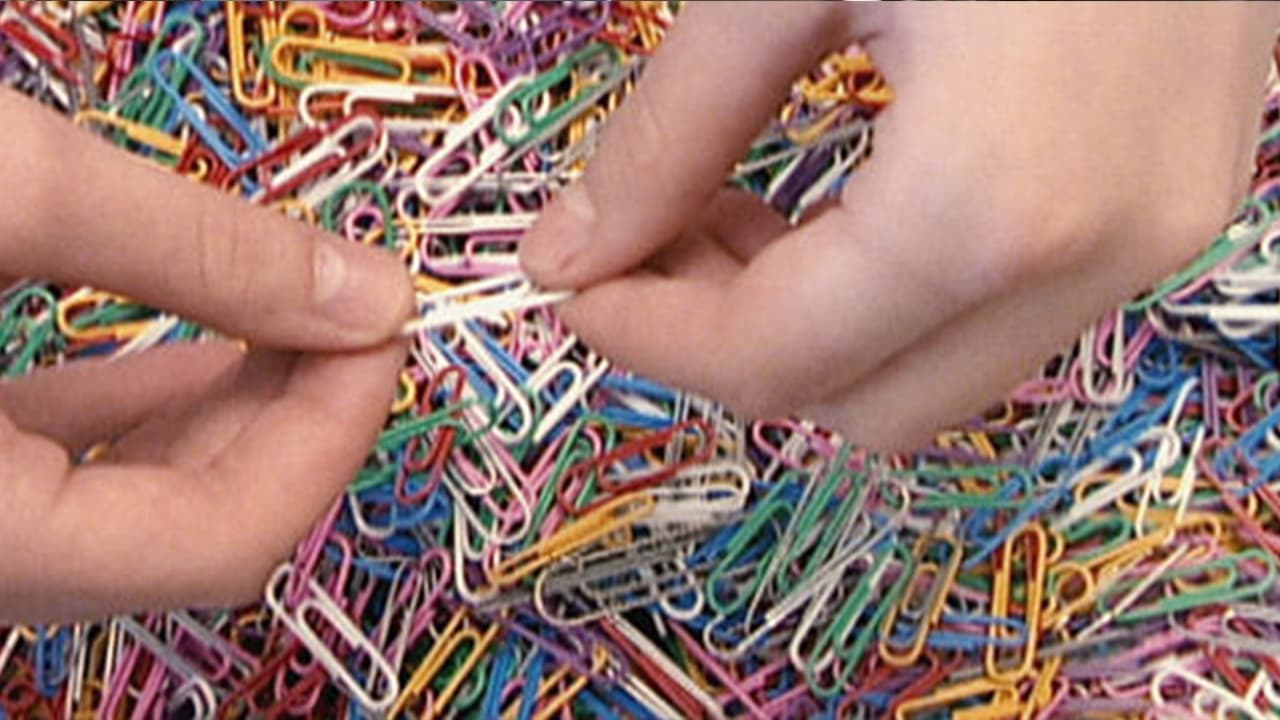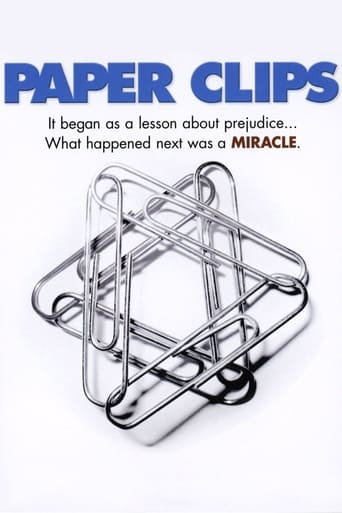

When a movie has you begging for it to end not even half way through it's pure crap. We've all seen this movie and this characters millions of times, nothing new in it. Don't waste your time.
... View MoreIt's an amazing and heartbreaking story.
... View MoreIf you like to be scared, if you like to laugh, and if you like to learn a thing or two at the movies, this absolutely cannot be missed.
... View MoreBlistering performances.
... View MoreI think the children were cool for doing this project but the film itself was very poor and boring. My mother who was watching the film with me could not keep her eyes open, she missed most of the film no doubt dreaming of half decent documentary films. Paper Clips could have been made 100% better. The camera quality was crap, there was no structure and the whining sounds of American children pretending to cry became more and more disturbing. Let the holocaust survivors have their say. Every time the survivors began to speak in the film, the whining of children would start and interrupt. Such a shame, the story is beautiful but the film didn't do the story justice. Inspiring story but very uninspiring film-making... God bless America
... View MoreThis documentary not only showed how people can make things happen and raise awareness, but how the media can be used for good purposes. Without the Internet, it is unlikely the collection of millions of paper clips would have been possible. And the connections of the two journalists were key, both in the media network they are a part of and as Europeans. I used this film in a class at a small university as an example of the positive power of people and the media. At times, the music was a bit overwhelming despite the thoughtful timing and pace of the film. Too many strings and soaring crescendos seemed to be meant to eek every last shred of emotion out of the viewer. Still, watching the impact of this marvelous project on the students and the community made amends for the musical gaffe.
... View MoreOne of the best documentaries in years regarding students and staff of Whitwell, Tennessee who embark upon a school project regarding the holocaust. The area is located in a homogeneous Protestant town where not one Jewish person resides.Kudos to Principal Linda Hooper and her assistant principal and 8th grade language arts teacher for devising this project. Over 29 million paper clips were collected, the latter representing the holocaust victims. We learn that paper clips came originally from Norway and was meant to unite. How appropriate.Holocaust survivors visit the town and relate their harrowing experiences to students, staff and town residents.Principal Hooper is certainly a hands-on administrator. She was directly involved in the project and shows her emotional vulnerability as she learned about what took place in Europe over 60 years ago.Through this project, the school was able to obtain a train car where victims were shipped to concentration camps. The ceremony was memorable when the car made its way to this rural Tennessee town.This magnificent documentary shows that we have the ability to learn tolerance and eventual acceptance of all people.It should definitely be shown in all public schools and the likes of Mel Gibson should be made to see it.Congratulations for a memorable experience. Thank you.
... View MoreI've never felt compelled to review a film on IMDb before, but in light of the uncritical adulation expressed by other viewers, I feel it would be irresponsible not to offer a counterpoint. "Paper Clips" is a deeply flawed, shallow wreck of a documentary that does a disservice to its audience, subject, and history.First, let me state that this is a review of the film, not the project it chronicles (although the film-makers don't really bother to distinguish between the two.) I'm not interested in debating the pedagogical merit of Whitwell Middle's Holocaust program. Likewise, I am in no way suggesting that we ought not to remember the Holocaust.A film of numerous faults, the over-riding flaw of "Paper Clips" is its failure to maintain a critical distance from its subject matter. Great documentaries in some way challenge our assumptions of ourselves and the world we live in. Biases, passions, and agendas can be gracefully incorporated, but a degree of scrutiny and objectivity must be maintained. "Paper Clips" never digs below the surface, looks for a deeper meaning behind its narrative, or suggests that the audience should take the words and actions of the students and teachers involved as anything but truth. Instead, it relies on musical cues, vague clichés about "tolerance" and "prejudice," and a bullet-proof morality (who would say anything bad about children learning about the Holocaust?) as it plods through a nonsensical feature length.It's not that "Paper Clips" fails at digging beneath the human interest surface, it doesn't even make an effort. The town of Whitwell and its people are the stuff of potentially powerful films- a deindustrializing Appalachian town dealing (or not) with its past demons of provincial prejudice, while facing an uncertain economic future. Instead, what we are coerced to accept is a regurgitation of hackneyed ideas of rural people as "just plain folks" with good old fashioned morals and hospitality. The very real legacy of racism and the current anti-immigrant hysteria in the South are left unexplored. Likewise, complex philosophical and ethical issues of historical memory and symbolic appropriation are ignored in favor of a "feel good" infomercial approach. The testimonies of Holocaust survivors are presented more for requisite tear-jerking and to demonstrate the golden hearts of the protagonists, it seems. Self-congratulation drowns out any discussion of the contested legacy of the Holocaust- who can speak for the victims, or how it is utilized for symbolic righteousness by contending groups (like, perhaps, the rural Southerners in the film who conflate "redneck" stereotypes with organized anti-Semitic campaigns of violence.) This, combined with clunky editing and an aesthetic somewhere between a country music video and a 700 Club feature, left me squirming in my seat.In his seminal work "The Society of the Spectacle," Guy Debord describes a contemporary society in which one's understanding of reality and history has been obscured by a barrage of abstracted symbols and images in the interests of spectacular consumption. Value can perhaps be found in "Paper Clips" as a sad comment on how close we are to such a vision. Essentially a socially conservative and politically liberal film, "Paper Clips" refuses to examine below the surface, plumbing for the social and economic causes of genocide, hatred, and ignorance, thereby effectively precluding even the remotest exploration of radical social change or critique. Intolerance, we are informed, is overcome by turning students into mini-bureaucrats managing spurious symbolic gestures. Evil and injustice are simple to understand and correct in the Disneyfied world of "Paper Clips"- no analysis needed! The film-makers merely add one more layer of confusion and alienation with their stubborn refusal to acknowledge a complex and troubling world. To let this film off the hook as just a simple story of hope or some such nonsense, is to insult and degrade its subjects, audience, and historical remembrance.
... View More